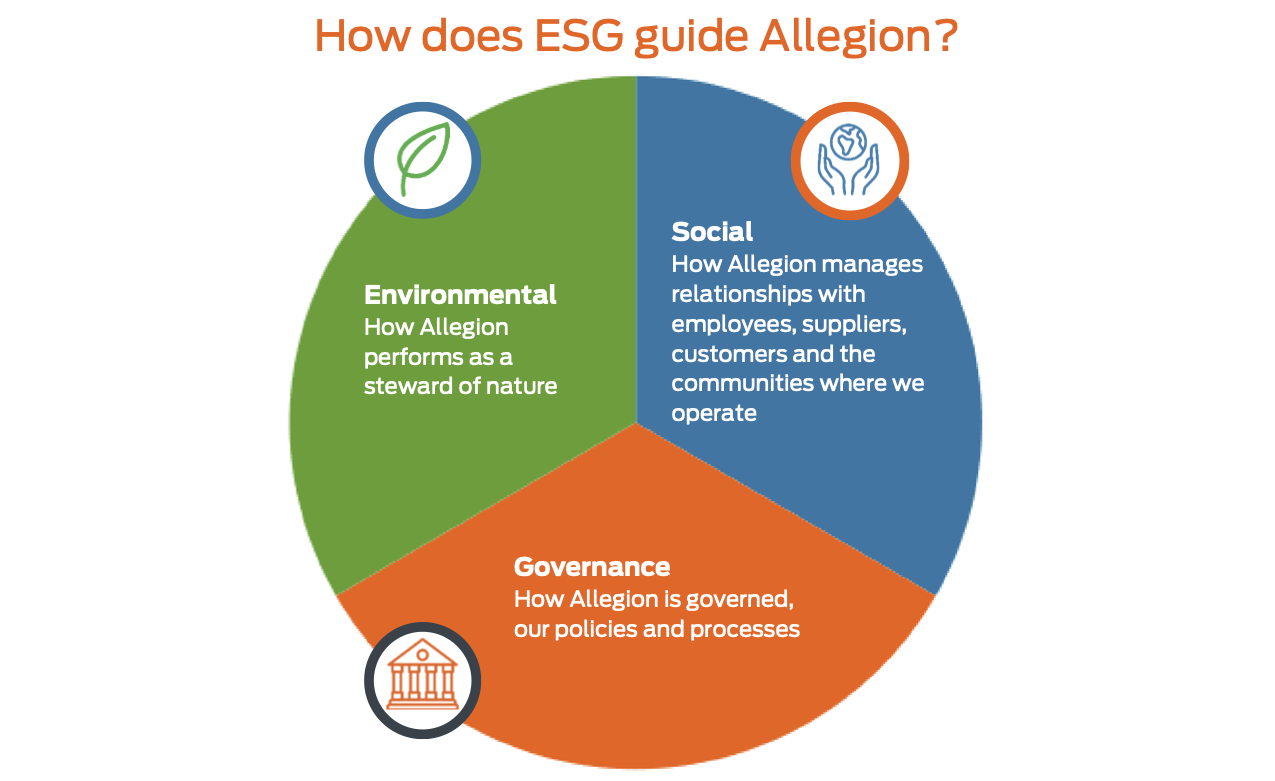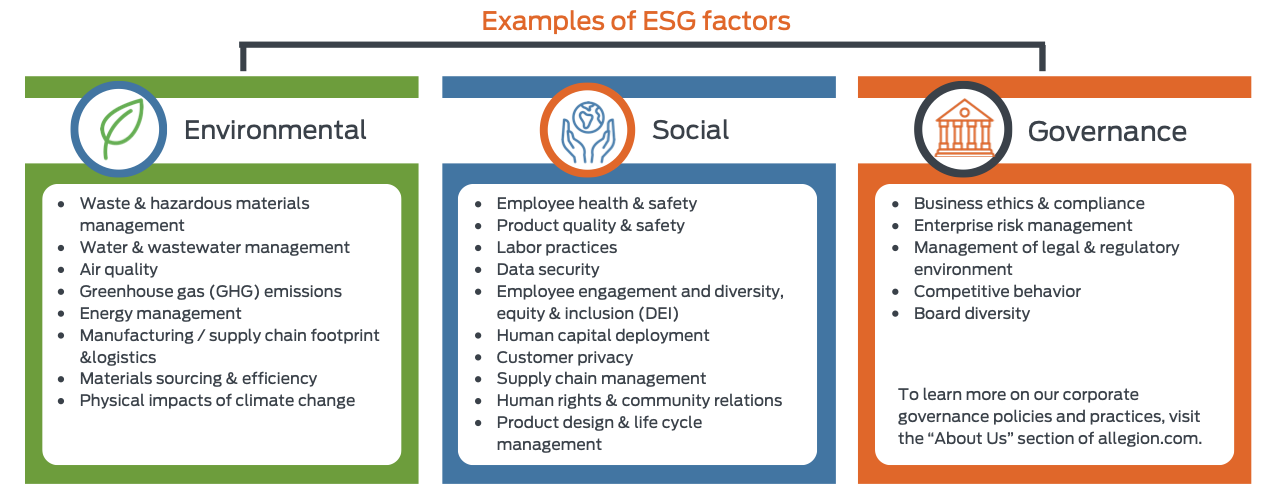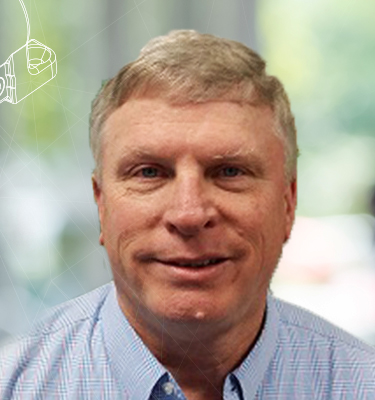

Environmental

Water usage intensity reduced 18%
As of Dec. 31, 2024, Allegion reduced its water usage intensity by 18% compared to our 2020 baseline year. By 2030, we aim to use 20% less water than we did in 2020.
In our ESG Goals & KPIs section, you’ll find year-over-year data for both normalized data and the actual volume of water used. While volume may vary due to factors such as production output, active hours or the number of sites we operate, normalized data allows us compare "apples-to-apples."
2 Data is normalized to hours worked. To the extent actual hours worked are not available for any full-time employee, an average of 40 hours per week is used.
3 Actual data is collected for production, assembly and distribution facilities and certain warehouses globally. For all other facilities, data is estimated based on the assumptions below:
- 15 gallons (or 57 liters) of water used per employee per workday.
- 2,700 British Thermal Units of natural gas usage and 1.5 kilowatt hours of electricity usage per square footage per month for office type facilities.
- 2,000 British Thermal Units of natural gas usage and 0.6 kilowatt-hours of electricity per square footage per month for all other facility types.
- 40 pounds (18 kilograms) of non-hazardous waste per employee per month.
4 Data associated with activities not related with production, assembly or distribution are excluded.
5 Data associated with acquisitions is included within values presented starting the year following acquisition.
6 Data associated with the majority of fleet fuel usage has not been included.
7 Data and metrics associated with the manufacturing and field service activities of Stanley Access Technologies is included in 2024 values (excluding the field service activities of Stanley Access Technologies, LTIR and TRIR were 0.12 and 0.44 for 2024). For 2023, only the manufacturing activities of Stanley Access Technologies are included. Baseline year 2020 has not been adjusted.
8 LTIR and TRIR reflect workplace related incidents as of 31 December of each year presented. Prior year amounts may be updated when incidents are determined to be workplace related in subsequent periods.

GHG emissions intensity (Scope 1,2) reduced by 34%
As of Dec. 31, 2024, Allegion reduced its greenhouse gas (GHG) emissions intensity (Scope 1 and Scope 2) by 34% compared to our 2020 baseline year. By 2030, we aim to achieve a 40% reduction in GHG emissions intensity for Scope 1 and Scope 2 emissions.
In 2024, Allegion increased its GHG emission intensity (Scope 1 and Scope 2) target from 25% to 40% based on continued improvements in its operations.
Allegion aims to achieve carbon-neutral emissions globally by 2050, and we support the U.N. Sustainable Development Goal to take urgent action on climate change. We know that some communities need time to build necessary energy infrastructure to make this vision a reality. In the meantime, our company is pursuing incremental improvement targets, including meeting Allegion’s electricity needs with 100% carbon-free electricity by 2030 (that is, the energy is produced by a non-fossil fuel source that generates no carbon emissions), and achieving carbon neutrality at 50% of our current sites by 2035.
1 GHG emissions calculations previously used a set formula globally. Calculations have been revised for 2020 through 2024 to utilize available location specific grid data.
2 Data is normalized to hours worked. To the extent actual hours worked are not available for any full-time employee, an average of 40 hours per week is used.
3 Actual data is collected for production, assembly and distribution facilities and certain warehouses globally. For all other facilities, data is estimated based on the assumptions below:
- 15 gallons (or 57 liters) of water used per employee per workday.
- 2,700 British Thermal Units of natural gas usage and 1.5 kilowatt hours of electricity usage per square footage per month for office type facilities.
- 2,000 British Thermal Units of natural gas usage and 0.6 kilowatt-hours of electricity per square footage per month for all other facility types.
- 40 pounds (18 kilograms) of non-hazardous waste per employee per month.
4 Data associated with activities not related with production, assembly or distribution are excluded.
5 Data associated with acquisitions is included within values presented starting the year following acquisition.
6 Data associated with the majority of fleet fuel usage has not been included.
7 Data and metrics associated with the manufacturing and field service activities of Stanley Access Technologies is included in 2024 values (excluding the field service activities of Stanley Access Technologies, LTIR and TRIR were 0.12 and 0.44 for 2024). For 2023, only the manufacturing activities of Stanley Access Technologies are included. Baseline year 2020 has not been adjusted.
8 LTIR and TRIR reflect workplace related incidents as of 31 December of each year presented. Prior year amounts may be updated when incidents are determined to be workplace related in subsequent periods.

Waste diversion rate 93%
The waste diversion (from landfill) rate is an essential metric for evaluating environmental performance because it reflects an organization's commitment to sustainability and resource conservation. Waste diversion reduces the environmental impact associated with waste disposal, such as greenhouse gas emissions, soil and water pollution and depletion of natural resources.
By measuring waste diversion rate, organizations can track their progress in reducing waste generation and promoting circular economy principles. It encourages the implementation of effective waste management strategies, such as source reduction, recycling programs and alternative treatment initiatives. A high waste diversion rate demonstrates a commitment to responsible practices, serves as a valuable indicator of environmental performance and can enhance an organization's reputation and stakeholder trust.
2 Data is normalized to hours worked. To the extent actual hours worked are not available for any full-time employee, an average of 40 hours per week is used.
3 Actual data is collected for production, assembly and distribution facilities and certain warehouses globally. For all other facilities, data is estimated based on the assumptions below:
- 15 gallons (or 57 liters) of water used per employee per workday.
- 2,700 British Thermal Units of natural gas usage and 1.5 kilowatt hours of electricity usage per square footage per month for office type facilities.
- 2,000 British Thermal Units of natural gas usage and 0.6 kilowatt-hours of electricity per square footage per month for all other facility types.
- 40 pounds (18 kilograms) of non-hazardous waste per employee per month.
4 Data associated with activities not related with production, assembly or distribution are excluded.
5 Data associated with acquisitions is included within values presented starting the year following acquisition.
6 Data associated with the majority of fleet fuel usage has not been included.
7 Data and metrics associated with the manufacturing and field service activities of Stanley Access Technologies is included in 2024 values (excluding the field service activities of Stanley Access Technologies, LTIR and TRIR were 0.12 and 0.44 for 2024). For 2023, only the manufacturing activities of Stanley Access Technologies are included. Baseline year 2020 has not been adjusted.
8 LTIR and TRIR reflect workplace related incidents as of 31 December of each year presented. Prior year amounts may be updated when incidents are determined to be workplace related in subsequent periods.
Social

Won 2025 Gallup award for exceptional workplace
For the second consecutive year, Allegion has been honored with the prestigious 2025 Gallup Exceptional Workplace Award, which recognizes the most engaged workplace cultures in the world — organizations that achieve more by helping their employees focus on what they do best. Employee engagement — a key factor in organizational achievement — reflects an employee’s commitment to the organization. Engaged employees tend to deliver higher productivity, stay with their organizations longer, have lower absenteeism and experience improved well-being.
The highly competitive award underscores the dedication of Allegion’s 12,000+ full-time employees around the globe. Last year, Allegion was among the first manufacturing companies ever to earn this distinction. Living our core values and taking ownership of engagement helps accelerate Allegion’s success and advance our vision of creating a safer and more accessible world.

Lost Time Incident Rate of 0.21
One of Allegion's core values is "Be safe, be healthy." Our top priority for our workers is their physical wellbeing, and we’re proud of the programs we have in place to support this.
In 2024, Allegion had a Lost Time Incident Rate (LTIR) of 0.21. Our teams are actively using valuable internal initiatives like our “Evaluating Your Environment for Safety (EYES)” and “Good Catch” programs to further our culture of safety. Additionally, we are leveraging new technologies, including artificial intelligence (AI), to facilitate risk assessment and mitigation strategies.
2 Data is normalized to hours worked. To the extent actual hours worked are not available for any full-time employee, an average of 40 hours per week is used.
7 Data and metrics associated with the manufacturing and field service activities of Stanley Access Technologies is included in 2024 values (excluding the field service activities of Stanley Access Technologies, LTIR and TRIR were 0.12 and 0.44 for 2024). For 2023, only the manufacturing activities of Stanley Access Technologies are included. Baseline year 2020 has not been adjusted.
8 LTIR and TRIR reflect workplace related incidents as of 31 December of each year presented. Prior year amounts may be updated when incidents are determined to be workplace related in subsequent periods.

Global teams serving Habitat for Humanity
Our communities — and the impact we have on them — matter to us. Each year, Allegion employees dedicate resources and volunteer hours to support local Habitat for Humanity chapters.
Allegion Australia proudly supports Habitat for Humanity Australia through donations and volunteer hours. Employees participate in the Brush With Kindness program throughout the year in Sydney, Brisbane, Melbourne and Adelaide, giving hundreds of hours of their time to help families in crisis.
Allegion Americas is in a $1 million partnership with Habitat for Humanity Mexico through 2027. Since 2016, our facilities in Tijuana, Tecate and Ensenada, Mexico, have donated more than $800,000 U.S. dollars, completing 40 new houses and 31 construction improvement projects for families.
As long-term partners with the Greater Indianapolis Habitat, too, we’ve donated more than $1.8 million and worked on 17 homes as of 2025. Allegion also donates Schlage locks for new homes each year — 434 homes and counting — in addition to supplies products for the organization’s Habitat Restore.
Governance

Independent chairs for board, committees
The Board has an independent chair, separate from the CEO. In addition, all Board committees and committee chairs are independent.

Board of Directors 75% diversity
Effective as of the Annual General Meeting in June 2025, we will have 75% diversity across gender, racial and ethnic representation among our Board of Directors.
When we consider adding members to the Allegion Board of Directors, we take into consideration a broad range of factors — including skills, expertise, business and leadership experience, board experience and viewpoints — that would complement the existing Board and contribute to enhancing the quality of its deliberations and decisions, recognizing that our businesses and operations are diverse and global in nature.
* Effective as of the Annual General Meeting in June 2025

Executive incentive payouts tied to the ESG objectives
As of 2023, a component of annual incentive compensation payouts for our executive leadership team is tied to our company's annual environmental, social and governance (ESG) scorecard performance.
1 GHG emissions calculations previously used a set formula globally. Calculations have been revised for 2020 through 2024 to utilize available location specific grid data.
2 Data is normalized to hours worked. To the extent actual hours worked are not available for any full-time employee, an average of 40 hours per week is used.
3 Actual data is collected for production, assembly and distribution facilities and certain warehouses globally. For all other facilities, data is estimated based on the assumptions below:
- 15 gallons (or 57 liters) of water used per employee per workday.
- 2,700 British Thermal Units of natural gas usage and 1.5 kilowatt hours of electricity usage per square footage per month for office type facilities.
- 2,000 British Thermal Units of natural gas usage and 0.6 kilowatt-hours of electricity per square footage per month for all other facility types.
- 40 pounds (18 kilograms) of non-hazardous waste per employee per month.
4 Data associated with activities not related with production, assembly or distribution are excluded.
5 Data associated with acquisitions is included within values presented starting the year following acquisition.
6 Data associated with the majority of fleet fuel usage has not been included.
7 Data and metrics associated with the manufacturing and field service activities of Stanley Access Technologies is included in 2024 values (excluding the field service activities of Stanley Access Technologies, LTIR and TRIR were 0.12 and 0.44 for 2024). For 2023, only the manufacturing activities of Stanley Access Technologies are included. Baseline year 2020 has not been adjusted.
8 LTIR and TRIR reflect workplace related incidents as of 31 December of each year presented. Prior year amounts may be updated when incidents are determined to be workplace related in subsequent periods.
* Effective as of the Annual General Meeting in June 2025
Our eight values are at the very heart of Allegion and the way we run our business.
These values are an important guide for our ESG efforts and approach.

Be safe, be healthy
Allegion promotes good safety and health habits, both inside and outside the office.
Whether it’s wearing protective gear, getting some fresh air and exercise, or taking a quick zen break, Allegion wants employees to protect their physical, mental and emotional well-being every day.

Do the right thing

“Do the right thing” encourages employees to act honorably in everything that they do. This value also reminds employees that if there is an inner voice telling you that something is wrong, it probably is - so don’t ignore it! Like all of its values, Allegion hopes that employees always do the right thing both at work and in their personal life.
Fabrizio is the Regional Specification Leader for Italy and Spain, working specifically with project based business. We asked Fabrizio why this was his favorite value, and he had this to say: “I mean, this reminds me that we always have a choice, and often the best thing to do is the tough path. Nevertheless, we do this because doing the right thing always leads to better results.”
Fabrizio considers this value core to all of Allegion’s values. “Customer experience is a part of our DNA. Ensuring that we do the right thing by our customers is always a focus of mine, and I believe that is true for many others at Allegion as well. This is the value that makes all the other values fall into place.”

Serve others, not yourself
“Serve others, not yourself” represents the idea of helping the people you work with and the people around you. Allegion encourages employees to be good corporate citizens by doing more for the communities in which they work and live. Many locations have developed a dedicated team of employees who plan, decide, and coordinate volunteer service projects for their campus, lifting up their local communities. Events like volunteering at the Ronald McDonald House, building a home with Habitat for Humanity, and environmental beautification projects are some of the most popular initiatives.

Be empowered and accountable
Allegion encourages employees to give themselves and others the tools needed to succeed. There isn’t needless red tape, or bureaucracy for the sake of bureaucracy. Employees have the freedom to be bold and take action, learning as much from failure as success.
Jessica H. feels that this value gives her the freedom to be creative and test out new possibilities, exploring new technologies.

This is your business, run with it
Your work is important! Question process. Cut out inefficiency. Look for ways to continually improve our business by making it your own. Never be satisfied with “Good enough,” and always think of ways we can be better – then work to make it a reality.

Be curious beyond the obvious
“Be curious beyond the obvious” encourages employees to be continually interested in everything, everywhere. The core of this value is a continual pursuit of innovation and creativity.
Learn how Dalton uses this value at work.

Have a passion for excellence

“Have a passion for excellence” emphasizes the idea of making Allegion a better company. In turn, having a passion for excellence makes us all a better version of ourselves as both an employee and as a person.
Kevin is the Specification Consultant Development Director for Allegion’s Specification Writing division. He serves as the trainer for the Specification Writers Program, and he is honored to be have an impact on people’s careers. “This is the most rewarding opportunity of my hardware career. I get the opportunity to shape the lives of these young people and provide them with a skill that will serve them regardless of where this company leads them.” Kevin lives this value every day, and in every part of his job. “Allegion has allowed me to develop and grow in many different ways. I’ve been trained in many different areas and offered opportunities to fulfill those trainings.”

Enjoy what you do and celebrate who we are
This value honors Allegion’s past, present and future, while bringing a spirit of play to work. Enthusiasm is contagious, and work is better when we love what we do. We take an honest interest in each other, celebrating all of our unique diversity.




